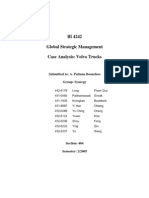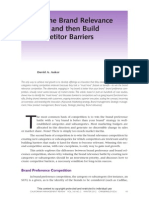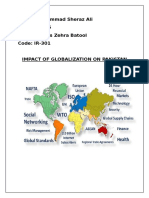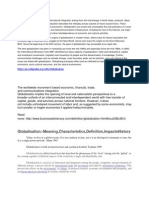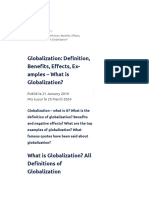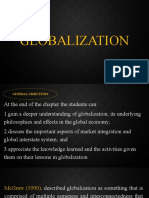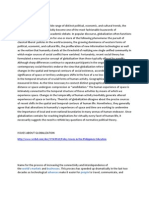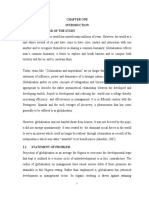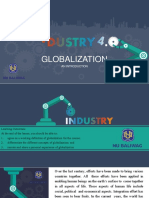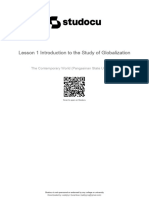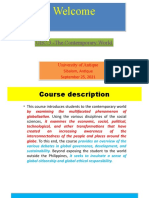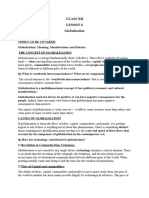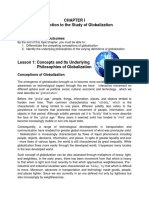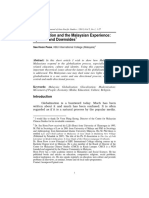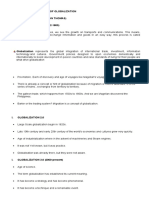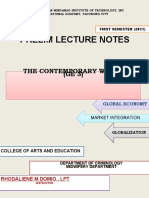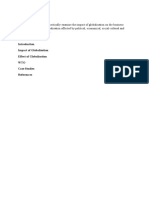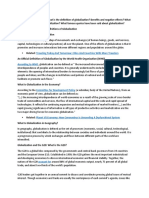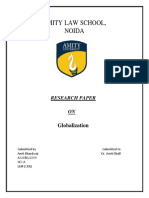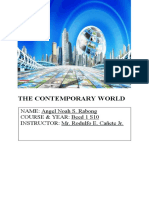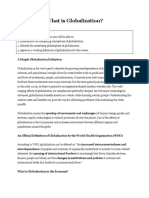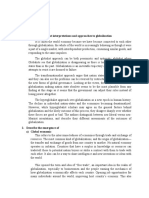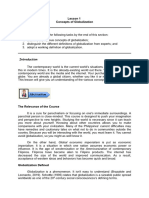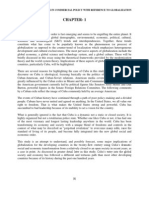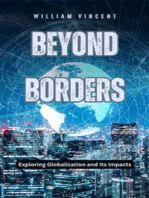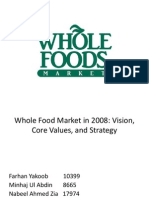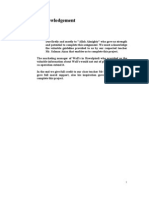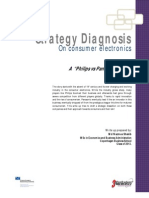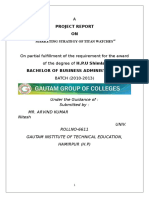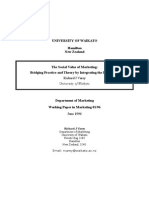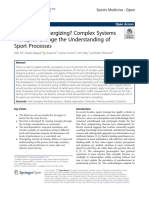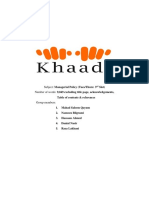4 Globalization PDF
4 Globalization PDF
Uploaded by
Muhammad Bin QasimCopyright:
Available Formats
4 Globalization PDF
4 Globalization PDF
Uploaded by
Muhammad Bin QasimOriginal Title
Copyright
Available Formats
Share this document
Did you find this document useful?
Is this content inappropriate?
Copyright:
Available Formats
4 Globalization PDF
4 Globalization PDF
Uploaded by
Muhammad Bin QasimCopyright:
Available Formats
GLOBALIZATION: CHALLENGES FOR PAKISTAN
Air Commodore Shahid Latif Bajwa
Introduction
Globalization is a term for the emergence of a global
society in which economic, political, environmental and cultural
events in one part of the world quickly come to have significance for
people in other parts of the world. This paper is aimed at discussing
what is globalization as characterized by different schools of
thought? What are the forces primarily propelling the process of
globalization? What is the role of developed countries and
multinational corporations in this process? What is the impact of
globalization on developing countries? Is the process evenly
affecting the developed and developing countries? And finally, what
is the best course of action for developing countries to deal with
globalization with particular reference to Pakistan? During the
course of research, descriptive research methodology was adopted
wherein available literature in the books, magazines, papers, articles
and internet was consulted.
Globalization is the result of advancements in
communication, transportation, and information technologies. It
describes the growing economic, political, technological, and
cultural linkages that connect individuals, communities, businesses,
and governments around the world. Globalization also involves the
growth of multinational corporations MNCs (businesses that have
operations or investments in many countries) and transnational
corporations (TNCs i.e businesses that see themselves functioning in
a global marketplace). The international institutions that oversee
world trade and finance play an increasingly important role in this
era of globalization.
Human societies across the globe have progressively
established closer contacts over many centuries, but recently the
pace has dramatically increased. Jet airplanes, cheap telephone
service, email, computers, huge ocean going vessels and instant
capital flows have made the world more interdependent than ever.
32 NDU Journal 2009
Air Commodore Shahid Latif Bajwa
Multinational corporations manufacture products in many countries
and sell to consumers around the world. Money, technology and raw
materials move ever more swiftly across national borders. As a
result, laws, economics, and social movements are forming at the
international level.
The phenomenon of globalization is a source of challenge
and an opportunity. Reinforced after the end of the cold war,
globalization is perceived as a force, which can integrate diverse
cultures and enables less developed countries to bridge the gap in
knowledge, information and technology. But globalization per se is
also considered as a major threat to those societies where the
capability to deal with the adverse ramifications of corporate
culture, free trade, competitive mode of production and other
capitalistic tendencies are limited. From any standpoint,
globalization has both positive and negative aspects.
The term “globalization” gained currency mainly in the last
quarter of the 20th century. The world has experienced
universalizing or globalizing influences since the commencement of
the Divine revelations. Modern history reveals that the world has
assimilated many universal trends such as, the rise of the nation-
state, mass production and division of labour, mass consumption,
mass communications, and global social movements. However, the
less developed countries (LDCs) and the civil society organizations
all over the world remain apprehensive about the current wave of
globalization.
However, “globalization” as a term acquired popular usage
only after the recent developments in fast flows of trade, finance,
technology, and information. Rapid travel and mass communication
led to a faster dissemination of the dominant world view that has
made the less developed societies uncomfortable as they remain ill-
prepared to receive and benefit from the globalization paradigm.
However, this paradigm that emerged in an environment external to
the developing world is now being pretty much imposed upon them
owing to their restricted range of choices and the subsequent weak
bargaining position. Nonetheless, the issue can still be approached
positively and constructively by the developing countries. That is
NDU Journal 2009 33
Globalization: Challenges for Pakistan
even though the range of choices for the developing world might be
restricted; it remains free enough to choose from either a reactive
response of self-pity and breast-beating or a proactive response1
aiming at enterprise, initiatives, and decisions in the desired
direction of development. For, effective behaviour should be a
function of own decisions rather than external conditions. Choice of
appropriate response to the current wave of globalization remains
very much the sole preserve of the developing world. For, the
intervening variable between an external stimulus and response is
freedom to choose appropriate response2 which the developing
world needs to be aware of so as to exercise it in its bid to brave this
challenge.
From the vantage point of the developing world, a
convergence needs to be struck essentially between the imperatives
of globalization and the concerns emanating from its implications
for the people in the developing world which is home to about 80%
of the global population. Action in this direction is necessitated at
both the international as well as national levels so as to achieve
inter-country as well as intra-country integration of the people. It
will be integration at both these levels that will eventually usher in
globalization in the true sense which implies an integration of all the
peoples of the world.
The concept of globalization or universalization of thoughts,
ideas, systems, and practices is not new.3 This piece of work traces
the process of globalization to as far back as the Renaissance when a
revival of arts, literature, and learning took place. The historical
background of globalization, in modern history is evaluated in
Section-2. This step is vital for a communication of the concept of
globalization without which third world’s response would remain
reactive rather than proactive. The role of key players in
globalization i.e. International Institutions and Multinational
Corporations (MNCs) is discussed in Section -3. The study of
impact / effects of globalization, the extent of challenges to the
nation state, the relationship between globalization and international
buzz words like extremism and terrorism is dealt in Section – 4. The
following sections dwell upon the challenges of globalization for
Pakistan and the policy measures it must adopt in order to make an
34 NDU Journal 2009
Air Commodore Shahid Latif Bajwa
effective response to the external environmental challenges by
capitalizing upon the opportunities and averting the threats.
For this purpose, there is a need for Pakistan to overcome the
internal weaknesses and build the internal strengths so to achieve
intra-country integration as well as integration with the global
economy if the current wave of globalization is found irreversible.
Pakistan would need to emerge as an effective participant in global
economic affairs and decision-making with a view to playing a key
role in the worldwide attempts being made to minimize the negative
implications of globalization as understood in the conventional
sense. Pakistan would then be contributing to the efforts aimed at
achieving “true” globalization.
Like many developing countries, Pakistan has not fully
prepared itself to blend with and benefit from globalization. This
study deals with the problems faced by developing countries in
general and Pakistan in particular while embracing the effects of
globalization. It also offers remedies to address the problems arising
out of it.
CONCEPT OF GLOBALIZATION
Definition of Globalization
A simple description of globalization is that ‘events
occurring on one part of the globe can effect and be affected by,
events occurring in other, distant part of the globe.4 In research
literature, the term ‘globalization’ is closely associated with
transnational interdependence and trans-boundary movement.
According to Holm and Sorenson, a definition of globalization is
’the intensification of economic, political, social and cultural
relations across borders’.5 According to Guillen “Intuitively,
globalization is a process fueled by, and resulting in, increasing
cross-border flows of goods, services, money, people, information,
and culture.6
Globalization in its literal sense is the process of
transformation of local or regional things or phenomena into global
NDU Journal 2009 35
Globalization: Challenges for Pakistan
ones. It can also be used to describe a process by which the people
of the world are unified into a single society and function together.
This process is a combination of economic, technological, socio
cultural and political forces. Globalization is often used to refer to
economic globalization, that is, integration of national economies
into the international economy through trade, foreign direct
investment, capital flows, migration, and the spread of technology.
Core Aspects and Key Characteristics. The process of
globalization is facilitated through a technological revolution in the
fields of telecommunications and transportation and in the formation
of global financial markets made possible by geo-political and
political changes, first and foremost the collapse of the Soviet Union
and its Communist satellite states.7 Hence, the increasing flow of
information, products, people, money, technology and expertise
across national borders and its consequences may be viewed as core
aspects of the globalization concept. Key characteristics of
globalization are ‘the speed of change and the compression of time
and space, produced by electronic communication technologies and
other means.8
Historical Perspective
Pre-Modern Globalization. The emergence of this modern
phenomenon is actually a pre-historic process which continued to
modify according to the prevalent political and economic system.
Since times immemorial, the world has been increasingly becoming
global. The process started almost as soon as mankind started to
trade. The Industrial Revolution in Europe (1830) and Colonialism
further hastened the process of economic integration’ albeit in an
exploitative fashion. The postwar Transportation and
Communications Revolution shrank the world as far as the
economic space and time was concerned. State and private-led joint
ventures, replaced the world system by creating more institutional
space for economic integration among nations.
Cold War Globalization. Just after World War-II, all the
victorious nations agreed to collectively manage the global economy
through an open market concept under the control of effective
36 NDU Journal 2009
Air Commodore Shahid Latif Bajwa
international institutions. This led to the establishment of Bretton
Woods Institutions such as International Monitory Fund (IMF) and
World Bank in 1944 and subsequently to General Agreement on
Tariff and Trade (GATT) in 1947. Hence, the initial period of Cold
War era saw an enormous expansion in free trade economy.
Post Cold War Globalization. These were the cross
roads when Russia got disintegrated resulting into a uni-polar world.
The capitalist system emerged as the only one for managing the
world affairs. This time it was not only the economy which affected
globalization but it involved other factors such as politics,
information, culture, sociology, etc. Thus the scope of globalization
became wider. The term ‘globalization’ acquired popular usage only
after the recent developments in fast flows of trade, finance,
technology and information. Anthony Giddens noted back in 1999
that while the term was hardly used ten years earlier, by the end of
1990s, the term was on everybody’s lips: ‘absolutely no one who
wants to understand our prospects and possibilities at the century’s
end can ignore it.’9
Key Players of Globalization
International Financial and Trade Institutions and Multi-
National Corporations are the Key Players of driving the process of
globalization.
International Institutions. At the conclusion of World
War II, several international institutions were created to manage the
world economy and prevent another Great Depression. These
institutions include the International Monetary Fund (IMF), the
International Bank for Reconstruction and Development (now called
the World Bank), and the General Agreement on Tariffs and Trade
(GATT), which was expanded and institutionalized into the World
Trade Organization (WTO) in 1995. These institutions have not only
persisted for over six decades, but they have also expanded their
mandates, changed their missions and increased their membership.
They have, however, become highly contested. As Joseph Stiglitz
notes, “International bureaucrats—the faceless symbols of the world
economic order—are under attack everywhere….Virtually every
NDU Journal 2009 37
Globalization: Challenges for Pakistan
major meeting of the International Monetary Fund, the World Bank
and the World Trade Organization is now the scene of conflict and
turmoil.”10
Conventional wisdom in international and comparative
political economy has held that international institutions, like the
IMF, World Bank, and WTO (and its predecessor, the GATT), have
been largely beneficial for the countries in them. These institutions,
it is claimed, constrain the behavior of the most powerful countries
and provide information and monitoring capacities that enable states
to cooperate.11 All states involved are better off with these
institutions than otherwise. Recently, however, evidence has
mounted that these institutions may not be so beneficial for the
developing countries.
Recent, empirical research asks the question of whether the
effect of these institutions on the developing world has been better
or worse with their presence than without it. The evidence suggests
that even though problems abound with the institutions one cannot
deny that without these institutions many developing countries could
be worse off in the bilateral negotiations with the most powerful
countries.
Multinational Corporations. There is no doubt that
leaving aside some of the richest countries in the world, MNCs own
most of the world capital and therefore are the main players in the
global economy.12 Their annual turnover reaches the astronomical
level of $100-200 billion, seemingly dwarfing the national
economies in the world. Their economic power enables them to play
a significant role on the global scene. As MNCs are the main players
behind the globalization of market economy; it would be worthwhile
to evaluate their positive and negative aspects:
The positive aspects
Financial and technical resources and
expertise. There is no denying the fact
that the MNCs bring in certain advantages to
the host societies. Huge resources and
investments, technology, innovation and
38 NDU Journal 2009
Air Commodore Shahid Latif Bajwa
expertise are made available to host societies
through these MNCs. A culture of research
and development, training in marketing and
developing human resource within the
organization is also beneficial for the host
societies. MNCs also contribute significantly
to the exchequer by paying taxes.
Good business practices. Good governance,
transparency within the organization,
delegation of power, performance based
evaluation and incentives program encourage
the merit-based approach. The work culture
and the professional working environment
within the organization are important
characteristics of MNCs. As MNCs are trend
setters, these practices are also followed by
the large national corporations. Even the civil
society is influenced by this professional
culture. The merit and knowledge based
professional culture leads to the promotion of
more efficient management and better
business education along with other important
disciplines in the society.
Comforts of life. The economies of scale,
quality control and healthy competition in
certain cases lead to price cuts and other
incentives to the end user. People get the
comforts of life at much cheaper rates and /or
at their doorsteps.13
Infrastructure improvement. Many
MNCs help in improving the infrastructure
and provision of basic needs in their specific
areas of operation. They do it directly or
provide funds to the civil society
organizations or give direct charity to
improve the living and business conditions in
areas where they are operating. While in
many cases these are voluntary practices, the
NDU Journal 2009 39
Globalization: Challenges for Pakistan
tax exemption facility provided under the law
also helps in encouraging such initiatives.
Pluralism. Because of MNCs, a kind of
interaction across the boundaries takes place.
Even education (particularly business) has to
take into account the global perspectives.14
Global perspectives and cross-cultural
understanding increase the adaptability of the
students anywhere in the world. This leads to
the mixing of cultures and practices and
encourages pluralism as well as competition.
Out-sourcing by MNCs particularly in
services sectors is relatively a new but
important phenomenon. The host countries
are thus becoming not just the workshop of
the world but the back office too.15 Besides
providing employment this is also promoting
pluralism. These can be great assets for
society if addressed positively.
The Negative Aspects
Increasing materialism and consumption.
The type of development, being promoted is
based on mere material gains. Luxuries and
comforts are being turned into needs and
necessities. Thus happiness and satisfaction
are being associated with luxuries and their
acquisition. Thanks to MNCs, “the
consumption culture” has over taken almost
the whole world, though it first took hold of
the developed world.
Excessive expansion of credit. The new
credit culture is changing the attitudes
towards loans. Loans are being encouraged to
facilitate the acquisition of the luxuries of life.
The offer of easy credit, consumer financing,
credit cards and personal loans by the banks
to the middle class is promoting a culture of
living beyond means. Life styles are changing
40 NDU Journal 2009
Air Commodore Shahid Latif Bajwa
because of it, and not necessarily for the
better.16
Corruption and Crime. Greediness,
disparities and sense of deprivation, along
with race to acquire new products is also
giving rise to corruption and crime. The focus
is on acquiring money in whichever manner it
comes; even through illegal means if it is not
available through legitimate sources. On their
part, MNCs also corrupt people in order to
capture markets.17
The brain drain. The term ‘brain drain’
is usually used for talent going towards other
countries in search of higher income. MNCs
are involved in yet another kind of brain
drain. With their capacity to pay, they can
hire the most qualified and experienced talent
available in the society. Those working with
MNCs consider themselves as part of an elite
class associated with the global community.
Consequently, most of them develop a culture
that makes them less relevant to their own
societies.
Family Fabric. The culture and life
style changes coming in with the spread of
MNCs’ influence in society are proving lethal
for the family fabric of host societies.
Overspending and living beyond means is
creating economic pressures, tensions and
stress within families. Various indicators
prove that women working with the MNCs
and other big organizations are under stress
when entering into marriages and bearing
children. Parents have little time for their
family, particularly children.
NDU Journal 2009 41
Globalization: Challenges for Pakistan
IMPACT ON DEVELOPING COUNTRIES
The Impact of Globalization
Globalization has wide-ranging political, economic, social
and cultural implications. The globalization debate has long
extended beyond the confines of economy to cultural changes, such
as possible evolution of global culture, on the one hand and, on the
other, counter-responses to globalization and the growth of
countercultures, for example, the worldwide resurgence of Islamic
militancy and the rise of anti-globalization movements.18 Much of
the literature on globalization, however, focuses on its economic
aspects.
‘Threat to nation-states’ is another topic in the globalization
debate. It has emerged due to the changes in the international state
system brought about by the globalization process, especially the
challenge to the state as an independent actor in the international
system. Although states respond to new transnational challenges by
investing more resources in multilateral organizations, their course
of action is being circumscribed by the institutional weight of the
largest organizations, such as the UN, EU, WTO and ASEAN etc.
Another prominent challenge to the state comes from the
increasing importance of transnational sub-state actors in
international politics. The term ‘trans nationalism’ was introduced
precisely to fill a gap in the prevailing state-centric paradigm to
‘denote interactions between non-state actors, that is, international
interactions that are not directed by states’, as it became clear that
the scope and impact of such interactions were too great to be
ignored.19 The challenge to the traditional territorial nation-state and
its prerogatives comes from both legal non-state actors, including
global civil-activist networks such as anti-globalization movement
as well as from illegal actors such as the Columbian drug syndicates
and the global terrorist network of Al-Qaeda.
42 NDU Journal 2009
Air Commodore Shahid Latif Bajwa
Effects of Globalization
Globalization has various aspects which affect the
developing countries in different ways such as:
Industrial. Emergence of worldwide production
facilities / markets and hence broader access to a
range of foreign products for consumers and
companies. Particularly, movement of material and
goods between and within national boundaries.
Financial. Emergence of worldwide financial
markets and improved access to external financing
for borrowers. Simultaneous, though not necessarily
purely globalist is the emergence of under or un-
regulated foreign exchange and speculative markets.
Economic. Realization of a global market, based
on the freedom of exchange of goods and capital.
Political. Some use "globalization" to mean the
creation of a world government, or cartels of
governments (e.g. WTO, World Bank, and IMF)
which regulate the relationships among governments
and guarantees the rights arising from social and
economic globalization.20
Informational. Increase in information flows
between geographically remote locations. Arguably
this is a technological change with the advent of fiber
optic communications, satellites, and increased
availability of telephone and Internet.
Cultural. Growth of cross-cultural contacts;
advent of new categories of consciousness and
identities which embodies cultural diffusion, the
desire to increase one's standard of living and enjoy
foreign products and ideas, adopt new technology
and practices, and participate in a "world culture".
Some bemoan the resulting consumerism and loss of
languages.
Ecological. The advent of global environmental
challenges that might be solved with international
cooperation, such as climate change, cross-boundary
NDU Journal 2009 43
Globalization: Challenges for Pakistan
water and air pollution, over-fishing of the ocean, and
the spread of invasive species. Since many factories
are built in developing countries with less
environmental regulation, globalism and free trade
may increase pollution.
Social International cultural exchange. Increased
circulation by people of all nations with fewer
restrictions.
Spreading of multiculturalism, and better
individual access to cultural diversity (e.g.
through the export of Hollywood and
Bollywood movies). Some consider such
"imported" culture a danger, since it may
supplant the local culture, causing reduction
in diversity or even assimilation. Others
consider multiculturalism to promote peace
and understanding between peoples.21
Greater international travel and tourism.
Greater immigration, including illegal
immigration.
Spread of local consumer products (e.g. food)
to other countries (often adapted to their
culture).
World-wide sporting events such as FIFA
World Cup and the Olympic Games.
Technical
Development of a global telecommunications
infrastructure and greater trans-border data
flow, using such technologies as the Internet,
communication satellites, submarine fiber
optic cable, and wireless telephones
Increase in the number of standards applied
globally; e.g. copyright laws, patents and
world trade agreements.
Legal/Ethical
The creation of the international criminal
court and international justice movements.
Crime importation and raising awareness of
global crime-fighting efforts and cooperation.
44 NDU Journal 2009
Air Commodore Shahid Latif Bajwa
Globalization and Extremism / Terrorism
Globalization has greatly increased the potential of distant
conflicts to transform into transnational terrorism by reducing the
significance of physical distance. The availability of faster means of
transport / communication like aircraft and cell phones / internet
have made the movement of extremist groups, their ideologies and
required finances equally faster. What we are really seeing in the
war on terror is that the increased "dispersion and democratization
of technology, information, and finance" brought about by
globalization has given terrorist groups greater mobility and access
worldwide. Globalization and resultant proliferation of technology
thus makes extremism / terrorism easier and deadlier in the short
term. However, same technology could be used to track / nab the
perpetrators. Moreover, in the long term, social-economic benefits
of globalization help shrink the social space on which the terrorist
ideologies thrive.22
Major factor behind al-Qaeda’s success is its reliance on
cyber space opportunities for propaganda and communication
purposes, bringing together disparate communities of sympathizers
and supporters, and facilitating contacts between operative cells
across continents. It is now believed that al-Qaeda, after
Afghanistan, is metamorphosing into a “virtual” network, depriving
its enemies of a geographical target. By posting electronic libraries
of ideological and theological literature as well as training manuals,
tactical handbooks and weapon instructions in written, audio and
video formats on the internet, al-Qaeda uses web as ‘an Open
University’ in its effort as fostering an Islamist-jihadist nation in
cyberspace.
GLOBALIZATION CHALLENGES FOR PAKISTAN
Impact on National Institutions
Globalization has had serious impact on Pakistan’s economy,
politics, society, law and religion. Like many other developing
countries, Pakistan is experiencing the positive and negative effects
of globalization. Along with some negative social effects, with the
NDU Journal 2009 45
Globalization: Challenges for Pakistan
opening of its economy in early 1990s, Pakistan has also seen the
forces of market and consumerism paving the way for a competitive
society. Some of the major fault lines which one can identify in
terms of globalization and human development in Pakistan are as
follows:-
The cultural implications of globalization.
Growing asymmetry in income distribution.
Growing unemployment because of stress on quality
control and standardization of manufactured goods.
Growing rural-urban divide.
Failure to create awareness and consciousness in at
the grassroots level about the advantages and
disadvantages of globalization.
Environmental fallout of increased industrial activity
and growing urbanization.23
As far as Pakistan is concerned, the confusion over
globalization becomes serious because of six parallel societal trends:
First, the ultra conservative or fundamentalist
elements who perceive globalization as nothing but a
tool of exploitation by the West and a cultural
invasion to pollute the Islamic way of life.
Second, moderate religious segments of society who
are less politicized and are less critical of
globalization but have suspicion and mistrust about
it.
Third, the ultra-modern such class who are real
beneficiaries of globalization and see things primarily
from the point of view of their economic and social
interests.
Fourth, the upper middle class, who see glamour in
globalization but have to climb many stairs in order
to be co-opted by the capitalist class.
Fifth, the middle class which has serious misgivings
about the economic and cultural fallout of
globalization but is at the same time interested in
seeking benefits from that system.
46 NDU Journal 2009
Air Commodore Shahid Latif Bajwa
Sixth, the lower class which has minimum
awareness about globalization, but is the worst
sufferer of development engendered by the market
economy.
In Pakistan, radical human rights activists oppose the neo
liberal type of globalization. They support instead the movement for
the globalization of UN based human rights. The Islamists on the
other hand, oppose the recognition in Pakistan of the UN based
rights of women and non-Muslims and strive to gain acceptance for
Islamic globalization. The state, while subordinating itself to the
neo-liberal agenda, usually sides with the Islamists on the question
of human rights. 24
Culture. Globalization of culture, at its most profound
level, sees the growing development of a consumer culture, a culture
that seems to encourage a new global vision. 25 The response of
Pakistani state to various cultural globalizations has been
inconsistent, contradictory and confusing. Partly this follows from
tensions within its national identity. On the one hand, Pakistan
aspires to remain a modernizing Islamic democracy with a
commitment to modern democratic freedom, on the other, theocratic
tendency, inherent in its freedom movement and later co-opted in its
constitutional and legal provisions by successive governments,
requires a manifest adherence to Islamic law and morality.
While, cultural globalization aims to push diverse cultures
into a melting pot shaping these in such a manner that the culturally
underprivileged groups are also able to play their role, there is a
backlash against globalization from the cultural nationalists. For
Islamists, globalization is a threat to the traditional family system
which encourages women to seek independence from the closely
knit family system. For modernists, globalization is an opportunity
to reshape Pakistan’s cultural paradigm by breaking traditional
taboos.
Economy. Since early 1980s, Pakistan has pursued a
policy of economic reforms and has introduced openness in its
economy. Pakistan first committed itself to accepting structural
NDU Journal 2009 47
Globalization: Challenges for Pakistan
reforms to liberalize its economic policies to accelerate the pace of
integration with global economy.26 After the inception of the WTO
regime in 1995, the process of linking Pakistan’s economy with the
global economy was accelerated.
Globalization was partly instrumental (other factor being the
Government’s policy on GWOT) in Pakistan being able to achieve a
sustainable average economic growth rate of 7.5 % from the year
2005 to 2007. Foreign debt was reduced to US $ 36.5 billion and the
economy no longer depended on foreign aid. Trade policy became
more liberal and more export oriented than it was previously.
Exports increased to over US $ 17 billion and the country attracted
over US $ 3 billion foreign investment. That was a manifestation
of the positive effects of globalization.
In 2008, worldwide economic recession and soaring oil
prices created grave problems for Pakistan’s economy. Foreign
exchange reserves plummeted to an all time low in the first half of
FY 2008-09. Deteriorating law & order situation has discouraged
the FDI. Flight of capital from the country and resultant dip in Forex
reserves has brought us close to the default. Unprecedented rise in
the oil prices adversely affected the prices of all essential
commodities especially food. That was a manifestation of the
negative effects of globalization. With the recent about reduction in
the oil prices, the Pak economy was on the path of overall recovery.
However, some recent ill-advised decisions by the Government and
resultant internal turmoil have jeopardized the economic recovery. It
has more to do with overall poor governance than with any external
factors like globalization.
Trade. Globalization demands quality control,
observance of intellectual property rights, removal of subsidies and
standardization of the goods manufactured. Initially, the Pakistani
exporters were unable to compete with their counter parts in the
developed countries because of the conditions imposed under the
World Trade Organization (WTO) regime. In Pakistan, the
manufacturers who have adjusted themselves to the trade demands
of the globalized world are not facing problems as the ones who
have failed to adjust to new realities.
48 NDU Journal 2009
Air Commodore Shahid Latif Bajwa
The sports goods industry came under bad light due to the
allegations of child labour. However, when the issue was addressed
amicably, there have been no further restrictions and the industry is
making good profit from the exports. The stringent quality control
regime has created some problems for the female employees of
textile / garment and food crop based industry. This might lead to a
significant decline in female employment in Pakistan. 27The best
way to tackle this challenge posed by globalization would be to
develop female human resource and convert this challenge into
opportunity. That is the only way to survive in this highly-
competitive Global Village to which no one can shut its doors.
Agriculture, industry, and new institutions. The foremost
impact of globalization can be seen in Pakistan’s cotton policy and
its export. A separate Ministry of Textile was established recently to
create an environment for healthy competition in the textile trade.
Industry, banking, and services sector have also undergone
tremendous transformation. The following new institutions were
created in Pakistan:
Ministry of Textile.
Ministry of IT and Telecom.
Ministry of Women Development.
Higher Education Commission (HEC).
Privatization Commission.
Board of Investment. (BOI)
Security & Exchange Commission of Pakistan.
(SECP)
Small & Medium Enterprise.
Some of these institutions have been a success story whereas
others have failed to measure up to the expectations. Ministry of IT
and Telecom has been instrumental in advancement of Information
Technology and revolution in the field of telecommunications.
Higher Education Commission (HEC) under Dr. Atta-ur-Rehman
managed to channelize the large funds available towards higher
education. During his tenure, a large number of foreign scholarships
were availed and local Ph D programmes were introduced;
controversies regarding the quality of some of the local research
NDU Journal 2009 49
Globalization: Challenges for Pakistan
work notwithstanding. Ministry of Textile has made some
contribution in promotion of value-added textile exports. Its success
has been limited due to powerful international textile lobbies. The
performance of Ministry of Women Development, Board of
Investment and Small & Medium Enterprise has been at best
average. Privatization Commission which was mandated to liquidate
under-performing or sick public sector enterprises, has emerged as a
party in loot sale of some national assets at the behest of powerful
vested interests. Security & Exchange Commission has generally
been a failure in safeguarding the interests of a large number of
stake holders. In the ultimate analysis, it is surmised that there is no
issue with the noble mandate of all these institutions. The problem
lies with the implementation which fells prey to the vested interests
of powerful bureaucratic and business lobbies.
Human Development. Pakistan, like other developing
countries is also facing the challenge of globalization particular with
reference to the issue of human development. Ironically, those at the
helm of the affairs in Pakistan have failed to understand the two
major realities of globalization. First, to develop indigenous
technology so as to better the infrastructure and quality of life of the
people of this country and to effectively deal with external
influences in the shape of superior products influx of information
impacting on society. Second, the failure of leadership in Pakistan to
unleash a process of knowledge revolution in order to improve the
state of human development.
Education. In the wake of globalization, privatization of
education is taking place in Pakistan at an unprecedented pace. So
far, for instance, over 30,000 private educational institutions have
been established in Pakistan.28 The main issue has been the
disparity between the standard of education in private / international
affiliated institutions and most of the government-owned schools.
Whereas, on one hand it has created a breed of youth fully equipped
to compete with the world, on the other is a larger breed severely
challenged in so far as the competitive world is concerned. It has
resulted in creating two distinct classes in the society: English
speaking and non-English speaking. The educational gap between
the ‘haves and the have-nots’ have been widened.
50 NDU Journal 2009
Air Commodore Shahid Latif Bajwa
Politics. Globalization is also emerging as a driving
force behind national policies and the process of democratization of
developing countries. Local and national values and identities are
being submerged by globalization.29 For instance, it is becoming
more difficult to impose and to sustain authoritarian or military rule.
Cognizant of likely reactions from the global community, the
military take over in Pakistan on October 12, 1999, for instance, did
not opt for imposing martial law in the country, unlike the situation
in 1958 and 1977. Such political developments were carefully
watched and monitored by outside forces. A crack down against
religious extremist groups in January, 2002 and again as a fallout of
recent Mumbai attacks is another example of political globalization.
Globalization is putting up fences and erecting barriers against the
rise of fundamentalist tendencies in many countries and more
specifically in the Islamic countries with Pakistan in the forefront.
Unfortunately, the rising tide has not been stemmed as socio-
economic uplift of the deprived segments of society, which happen
to be fertile for such tendencies, has not materialized. As such, the
social space wherein the extremist ideologies thrive has not been
curtailed.
Religion. Muslim societies have been affected by the wave
of globalization. Islamic values including family relations and
women rights have been subjected to criticism as a result of
globalization. The situation has been compounded by the wanton
acts of the terrorists who, in the name of Islam, have taken
thousands of innocent lives. Ironically such activities have
proliferated around the world riding on the vehicle of globalization.
Partly out of their sheer ignorance and partly due to the negative /
biased projection in media, which is again a vehicle of globalization,
a large portion of non-Muslim world has started to take Pakistan as a
bastion of extremism and terrorism.
Human Rights. Hand-woven carpets and sport goods
produced through child labor in Pakistan have been frequently cited
as human rights violations. Western countries even banned the
import of such goods, as they wanted certification of ‘Free of Child
Labor’ for the import of such items into their markets. For instance,
they also wanted implementation of stronger FIFA (Federation of
NDU Journal 2009 51
Globalization: Challenges for Pakistan
International Football Associations) code by the Sialkot Chamber of
Commerce and Industry to make sure that human rights violations
did not occur. It needs to be pointed out that human rights
organizations have failed to seriously take up issues regarding
severe human rights violations in Kashmir or Palestine where the
involved states continue to exploit the situation by employing the
worst form of what is often referred to as ‘state terrorism’.30
CONCLUSION AND RECOMMENDATIONS
Conclusions
In the context of Pakistan, the benefits of the globalization
will take place primarily through good governance and rapid
economic growth. Few conclusions emerging from the discussion so
far are: -
In the globalized world, only those nations have a
chance to succeed who have excelled in knowledge,
information and technology. Countries with strong
work ethics, sound educational system, social and
economic justice, political stability and the rule of
law can transform the challenge of globalization into
an opportunity.
The road to human development in Pakistan cannot
be smooth if people are without a basic sense of
security: the affluent class keeps a monopoly over
power, resources, whether human, material or of
information. Without inducting professionalism in
society through better work ethics, social justice,
good formal education, sound technical training and
rule of law, the major indicators of human
development cannot be positive.
As long as knowledge is not processed in Pakistan in
the shape of power, there will continue to be the
curse of poverty, illiteracy, underdevelopment and
unemployment. A knowledge based economy and
education aimed at benefiting the majority of people
52 NDU Journal 2009
Air Commodore Shahid Latif Bajwa
by uplifting their quality of life should be the
hallmark of the state and society of Pakistan.
Courses Available. Having closely studied the
process of globalization with a view to assess its impact on
developing countries which Pakistan is a part of, following are the
courses of action available to the developing countries in general
and Pakistan in particular: -
Course A. Become part of the globalization by
accepting the international norms, in the areas which
do not challenge the national identity / interests. In
this regard, China is an example which has accepted
some fundamental changes even in her culture.
Course B. Become part of the system by
accepting all its features. Open the country for free
flow of economics, technology, education, media,
culture and foreign direct investment with minimal
conditions. In this regard, Belgium is an example
which is one of the most globalized countries.
Course C. Do not become part of this process,
workout own priorities and policies of protectionism
to maintain strong grip over all state institutions. This
would mean driving yourself away from the
mainstream the world which would be somewhat
similar to the Cold War era Soviet Union.
Recommended Course. Course ‘A’ is
recommended. This course goes along with the
dynamics of Pakistani society. In fact, it is already
being followed in one form or the other, by design or
by default. Basically what we need to do is
strengthen our institutions; be it political, economic,
educational, cultural or commercial. The
recommendations for complete adoption of this
course are discussed in the succeeding paragraphs.
NDU Journal 2009 53
Globalization: Challenges for Pakistan
Recommendations
General. Like any development in human society, the
MNCs being the main instruments of globalization, have both
negative and positive sides. Nevertheless, it is a fact that these
MNCs have contributed a lot to growth in developed countries. The
reason being they (both societies and MNCs) have progressed side
by side and along with each other. It has been an evolutionary
development and there are now strong institutions, legislative
bodies, regulatory agencies, judicial system and consumer societies
to check and maintain the balance from within. However, in case of
the developing host societies a rather uneven contest is taking place.
This needs to be addressed as discussed in succeeding paragraphs.
Three levels of intervention
At the grassroots level, popular consumer movements
need to be organized to take care of this unequal
contest. MNCs need to be influenced to conduct
social research related to the host countries’ problems
and to contribute certain portions of their profit to
social sector development, particularly education and
social sector development in the host societies. This
is one level of intervention.
The other stage of intervention relates to
governments, both at local and global levels. While
host societies should legislate according to the local
needs ensuring that benefits and burdens are evenly
distributed with a bias in favor of low income groups.
31
The issue needs to be addressed at the global level by
the UN and its relevant (UNCTAD and other)
agencies. It needs to be made clear that there should
be a global strategy to chalk out a comprehensive
program of moving towards healthy competition by
the present inequalities. Indeed this is possible if
businesses start creating value not only of stake
holders but also for the societies and the ecology.
54 NDU Journal 2009
Air Commodore Shahid Latif Bajwa
Pakistan Specific
Stable Political System. Being the key institution on
which all the other institutions depend, a stable political system
should be allowed to take root with least interference from the
establishment: civil / military bureaucracy. Free, fair and timely
elections will bring out the best from people and strengthen the
system. The politicians may falter initially; they will ultimately start
to take correct decisions through consensus. The ultimate control of
all instruments of national power must lie with the political
government.
Economic Revival. In the quest for economic revival,
various areas that need immediate attention are:
International Trade. Despite adoption of liberal
trade policies over the last decade, there are still
some impediments in growth of our international
trade, which need to be immediately addressed in
order to bring it in line with the global trends.
Following steps are recommended: -
Revival of investor confidence through
removal of procedural hitches and
improvement of law and order situation.
Improvement in the quality of production
through total quality management and
competitive pricing in line with the
international market.
Revitalization of commercial sections of our
embassies abroad and posting of competent
commercial attaches with well-defined
incentive-based trade targets to be achieved in
given time.
Restructuring and mechanism for close
coordination of all Government bodies
dealing with exports.
Foreign Direct Investment. Following are the
specific areas of improvements: -
NDU Journal 2009 55
Globalization: Challenges for Pakistan
Foreign investors should be allowed to
negotiate the terms and conditions of payment
of royalty and technical fee suited to them as
well as acceptable to the multinationals for
transferring technology.
The government must further liberalize the
foreign exchange regime. Foreigners should
be allowed to bring in, possess and take out
foreign currency and to open accounts and
hold certificates in foreign currency. The
Government should continue extensive
investment incentives including credit
facilities, fiscal incentives and visa policy.
The country must maintain continuity of well
thought out investment policies regardless of
the change in the government. A stable
political system is the key for such continuity.
Promotion of Culture. In this age of media explosion,
no society or culture can remain totally isolated from the influence
of the other cultures. The best way to safeguard own cultural values
and traditions is to take pride in them and infuse same in the
younger generation. Following measures are recommended in this
regard:
Revitalization of educational syllabus to promote
pride in own culture and encourage pluralism through
respect for other cultures.
Government patronage for holding various cultural
events and encouragement of whole-hearted
participation by all segments of society and not only
the elite class.
Strict action against the elements who try to sabotage
cultural activities in the name of religion.
Development of the historical sites and allied
facilities on international standards to promote
cultural heritage through tourism.
Active role by the media in promotion of own culture
and checking invasion of unwanted culture as well as
56 NDU Journal 2009
Air Commodore Shahid Latif Bajwa
countering anti-culture propaganda of the
fundamentalists.
Foundation of Technical / IT Base. The factors needed to
be addressed in this regard are: -
Focus and generous funding on technical education
right from the school level.
Establishment of international standard institutes of
science and technology like the five Indian Institutes
of Technology which are regarded as premier world
class institutions.
Special incentives and requisite facilities for HRD in
the field of IT and development / export of computer
software.
Brain Drain. Rising demand of professionals in modern
fields such as Information Technology has resulted in wave of
migration from Pakistan to the Western countries. This phenomenon
could turn out to be a blessing in disguise. These professionals who
are migrating will provide strong linkages and act as I.T experts
from Pakistan in the medium to long term. However, in the short
term this exodus is creating substantial gap between the demand and
supply of technical personnel within Pakistan. This drain on well-
trained / competent human resource should be addressed by
broadening the base of HRD in the same fields.
Conclusion
In a nutshell, the process of globalization has been taking
place for centuries. The modern technological revolution has only
hastened the process. Globalization has been affecting both the
individuals and the states alike, as the impact of globalization is all
encompassing. As a result of globalization, not only the traditional
authority of the state has begun to erode, the very basis of the
nation-state system is also being questioned. Transnational
corporations and institutions have been gaining immense influence.
The process has become a source of integration as well as
confrontation between and among the states in the present day
NDU Journal 2009 57
Globalization: Challenges for Pakistan
international system. Being largely rigid and conservative, the
developing societies, states, institutions and values have been
experiencing both the advantages and perils of globalization. To
what extent the process of globalization would ultimately effect
developing countries is as yet difficult to determine.
Globalization offers many opportunities to the nations
willing to take risks. However, if nation states sacrifice too much of
their identities to the dictates of border less economy, a black lash of
globalization can occur. Therefore, in order to reap the benefits of
the globalization and to reduce their vulnerability, it is important to
open the economies but the liberalization of the economy should be
in gradual phases coupled with domestic macro economic stability
based on a transparent financial system.
Through the process of globalization the world needs to
move towards establishing a true global village, while maintaining
the cultural diversity of various countries. Diversity is the beauty of
life and is a great human asset. Any effort by a dominant group to
impose a particular culture on the rest of the world will create
problems for the whole world. What we need is a human face of
globalization.
As for future of globalization, it is reasonable to assume that
the process of increased interconnectedness, interdependence and
softer borders will continue. The CIA-sponsored Global Trends
2015, published in late 2000, revised its previous estimates by
placing even more emphasis on globalization ‘as a more powerful
driver’ than previously anticipated.
Notes
1
Stephen R Covey, The Seven Habits of Highly Effective People, Ch-1, Sydney:
Simon & Schuster, 1989.
2
Ibid.
3
Paul Streeten, “Globalization: Threat or Opportunity?” The Pakistan
Development Review, Vol.37, No.4, Part I, Winter 1998, pp.51-76.
4
Caroline Thomas, ‘Poverty, Development and Hunger’, in John Baylis and Steve
Smith (eds) The Globalization of World Politics: An Introduction to International
Relations (Oxford: Oxford University Press,1999),p.464.
58 NDU Journal 2009
Air Commodore Shahid Latif Bajwa
5
Hans-Henrik Holm and Georg Sorensen, Whose World Order? Uneven
Globalisation and the End of the Cold War (Boulder, Col.: West View,1995), p.4.
6
www.gsm.uci.edu/econsoc/Guillen.html
7
Erik Oddvar Erikson, Globalisation and Democracy (University of Oslo Press,
1999), ARENA Working Paper No. 23, p.1.
8
Richards Devetak and Richard Higgott,’Justice Unbound? Globalisation, States
and the Transformation of the Social Bond’, (International Affairs 75 (3) July
1999),p.491.
9
Anthony Giddens, ‘Globalisation: An Irresistible Force’, Daily Yumiuri June 7,
1999, http:www.globalpolicy.org/globalize/define/irresfrc.htm.
10
Joseph Stiglitz, E. 2002. Globalization and Its Discontents.( NY: Norton), p.3.
11
Helen V. Milner, Globalization, Development, and International Institutions:
Normative and Positive Perspectives, (Princeton University, September 14,
2005).
12
Khalid Rehman, The Role of MNCs and their Socio-Economic Impact on Host
Societies, ASCE (University of Karachi), p.23.
13
Ibid, p.36.
14
N.M. Kondap (Vice Chancellor Narsee Monjee University), Changing
Paradigms, Business India, October 22, 2006.
15
Trade on Human Terms, Asia Pacific Human Development
Report,2006,UNDP.
16
Khalid Rehman, The Role of MNCs and their Socio-Economic Impact on
Host Societies, ASCE (University of Karachi), p.40.
17
A report titled: Milking Profits, The Network for Consumer Protection,
Islamabad, 1999.
18
Brynjar Lia , Globalization and the Future of Terrorism, (Routledge, London
and New York), p.19.
19
Louise Richardson, Terrorists as Transnational Actors, Terrorism and
Political Violence 11(4) (winter 1999), p.210.
20
Charles E.Hurst., Social Inequality: Forms, Causes, and Consequences, 6th
ed. P.91 (Wikipedia)
21
J.Scherer, Globalization and Promotional Culture, New Media & Society
9/2007,p. 475–496. (Wikipedia)
22
Brynjar Lia , Globalization and the Future of Terrorism, Routledge, London
and New York, p.24.
23
Moonis Ahmar, Globalization:Economic,Social and Political Dimensions,
ASCE, (University of Karachi), p. 179.
24
Ishtiaq Ahmed, Globalization and Human Rights in Pakistan, International
Journal of Punjab Studies, op. cit.
25
Abul Kalam, Challenges of the Age of Globalization, Spotlight on Regional
Affairs, (Islamabad: Institute of Regional Studies, Vol.XX, No.4, April2001), P.8.
26
Jennifer Bennett, Globalization and Human Development in Pakistan and
India, (Colombo: RCSS, 2001), p.167.
27
Research undertaken by the Sustainable Development Policy Institute (SDPI),
Islamabad.
28
Government of Pakistan, Economic Survey 2004-5, p.145-6.
NDU Journal 2009 59
Globalization: Challenges for Pakistan
29
Catarina Kinnval, C Kinnval, & Kristina Johnson, Globalization and
Democratization in Asia, (London: Routledge, 2002).
30
Alison Brysk (ed.), Globalization and Human Rights, (California:University of
California Press,2002) in PI Cheema, Globalization:Economic,Social and
Political Dimensions ASCE, (University of Karachi), p. 107.
31
UN Committee on Trade and Development, Multinational Corporations in
Least Developed Countries, available at
http://www.globalpolicy.org/reform/2002.
60 NDU Journal 2009
You might also like
- Case Analysis 2 Columbia SportswearDocument15 pagesCase Analysis 2 Columbia SportswearRos Shinie Balan67% (3)
- ChipsCo Business PlanDocument55 pagesChipsCo Business PlanBryan Panto90% (10)
- Module in Gec 3Document169 pagesModule in Gec 3Tam Mi100% (5)
- Shuraako Concept Note Form - LiteDocument11 pagesShuraako Concept Note Form - LiteEng Abdulkadir MahamedNo ratings yet
- Volvo Trucks CaseDocument33 pagesVolvo Trucks Caseravichauhan18100% (3)
- Executive Summary: Fun To Be No.1Document51 pagesExecutive Summary: Fun To Be No.1Anand Ingale100% (1)
- David Aaker Brand Relevance Lifeling LearningDocument0 pagesDavid Aaker Brand Relevance Lifeling LearningBhavsimran S. SyalNo ratings yet
- Assignment 3Document35 pagesAssignment 3Kawser DiptoNo ratings yet
- Module For The Contemporary World 2020Document133 pagesModule For The Contemporary World 2020Shen Eugenio100% (1)
- Challenges of Globalization For BangladeshDocument11 pagesChallenges of Globalization For Bangladeshziaulh23No ratings yet
- Impact of Globalization On Pakistan111Document12 pagesImpact of Globalization On Pakistan111Sheraz AliNo ratings yet
- Introduction To The Study of Globalization: Ge103 - The Contemporary WorldDocument4 pagesIntroduction To The Study of Globalization: Ge103 - The Contemporary Worldmaelyn calindongNo ratings yet
- Module 1 GlobalisationDocument15 pagesModule 1 Globalisationnitindhiman3086320% (1)
- What Is Globalization? Examples, Definition, Benefits and EffectsDocument29 pagesWhat Is Globalization? Examples, Definition, Benefits and EffectsPearly Rose V. ManlapasNo ratings yet
- Contemporary WorldDocument25 pagesContemporary WorldAnne MolinaNo ratings yet
- World's Markets Businesses Advances PeopleDocument6 pagesWorld's Markets Businesses Advances PeopleMgn CalivaNo ratings yet
- What Is Contemporary World?Document2 pagesWhat Is Contemporary World?Shieralyn IglesiaNo ratings yet
- What Is GlobalizationDocument12 pagesWhat Is GlobalizationStéphane DoueuNo ratings yet
- Contemporary World Module PDFDocument168 pagesContemporary World Module PDFjudi2685No ratings yet
- Chapter One 1.1 Background of The StudyDocument22 pagesChapter One 1.1 Background of The StudyEdobor OsayemwenreNo ratings yet
- The Contemporary World 0005-32 Term PaperDocument7 pagesThe Contemporary World 0005-32 Term PaperTricia Mae TalplacidoNo ratings yet
- Module 1.2 GlobalizationDocument13 pagesModule 1.2 GlobalizationJade BoadoNo ratings yet
- Contemporary World Module 1Document5 pagesContemporary World Module 1Arnel BoholstNo ratings yet
- Lesson 1 Introduction To The Study of GlobalizationDocument5 pagesLesson 1 Introduction To The Study of GlobalizationLarry QuiambaoNo ratings yet
- 1 Introduction Lesson 1 GEC 3Document33 pages1 Introduction Lesson 1 GEC 3Jose Carlo ParangueNo ratings yet
- Lesson 5 - Global NetworksDocument26 pagesLesson 5 - Global NetworksGerald SioquimNo ratings yet
- Class 12 Lesson 6 GlobalisationDocument6 pagesClass 12 Lesson 6 Globalisationdorothychauhan13No ratings yet
- Process of Globalisation - NotesDocument5 pagesProcess of Globalisation - NotesSweet tripathiNo ratings yet
- Chapter IDocument6 pagesChapter IRegine DimaanoNo ratings yet
- Week 1 Module Contemporary WorldDocument2 pagesWeek 1 Module Contemporary Worldkassel PlacienteNo ratings yet
- Globalization (2008) Globalization and The Challenge For Nigeria's Development in The 21st CenturyDocument12 pagesGlobalization (2008) Globalization and The Challenge For Nigeria's Development in The 21st CenturyEme09No ratings yet
- Global Iast I OnDocument29 pagesGlobal Iast I OnShuen NyinNo ratings yet
- Amit GLDocument24 pagesAmit GLnehaNo ratings yet
- Contemporary World Slides Week 1 2Document26 pagesContemporary World Slides Week 1 2markjhonsenolorazaNo ratings yet
- Networking Plays A Pivotal Role in Establishing Relationship Between Nations in The World Resulting ToDocument9 pagesNetworking Plays A Pivotal Role in Establishing Relationship Between Nations in The World Resulting ToThea HerediaNo ratings yet
- Ucsp Case StudyDocument3 pagesUcsp Case StudyAlyssa TyNo ratings yet
- Globalisation EssayDocument27 pagesGlobalisation Essaycarmenc92No ratings yet
- GEC 3 ModuleDocument182 pagesGEC 3 ModuleChristian Zen AbarientosNo ratings yet
- TCW ReviewerDocument29 pagesTCW ReviewerReeze Vreena TamarayNo ratings yet
- Ge3 - The Contemporary WorldDocument11 pagesGe3 - The Contemporary WorldKein Irian BacuganNo ratings yet
- GlobalizationDocument5 pagesGlobalizationflintoff911No ratings yet
- Traveling Today and Tomorrow: Cities and Countries With More TravelersDocument10 pagesTraveling Today and Tomorrow: Cities and Countries With More TravelersLANGWAEMILLNo ratings yet
- Amit GL FinalDocument19 pagesAmit GL FinalnehaNo ratings yet
- ActivityDocument10 pagesActivityAngel Noah RabongNo ratings yet
- Contemporary World Module 1Document9 pagesContemporary World Module 1lanaronaldjhonNo ratings yet
- What I Need To KnowDocument6 pagesWhat I Need To KnowPaulo TarucNo ratings yet
- Research Papers On Globalization and Its EffectsDocument5 pagesResearch Papers On Globalization and Its Effectsfvg7vpte100% (1)
- Jordaan Challenges28200129Document14 pagesJordaan Challenges28200129asemahlejoni1No ratings yet
- GlobalisationDocument10 pagesGlobalisationJanvi SinghiNo ratings yet
- GlobalizationDocument12 pagesGlobalizationNeil TalamanNo ratings yet
- Chapter One 1.1 Background of The StudyDocument21 pagesChapter One 1.1 Background of The StudyEdobor OsayemwenreNo ratings yet
- Trends Module 5 Grade 12 FinalbjshheDocument7 pagesTrends Module 5 Grade 12 FinalbjshheSecond Gmail AccountNo ratings yet
- Contemporary World: GlobalizationDocument4 pagesContemporary World: GlobalizationAllyza Marie PeñaNo ratings yet
- Soc Sci 1Document14 pagesSoc Sci 1JOY YangcoNo ratings yet
- Lesson 1 Defining GlobalizationDocument3 pagesLesson 1 Defining GlobalizationHanna Shailene LopecilloNo ratings yet
- Ge5 The Contemporary World Lesson 1 8Document29 pagesGe5 The Contemporary World Lesson 1 8Yram AbuanNo ratings yet
- Chapter-1: Trends in Commercial Policy With Reference To GlobalizationDocument37 pagesChapter-1: Trends in Commercial Policy With Reference To Globalizationartistpooja_86031319No ratings yet
- What Is GlobalizationDocument10 pagesWhat Is Globalizationassis alihNo ratings yet
- The Contemporary World: Chapter 1Document5 pagesThe Contemporary World: Chapter 1Jean OpallaNo ratings yet
- Globalization As A Force of Social ChangeDocument6 pagesGlobalization As A Force of Social ChangeKasun JayasekaraNo ratings yet
- FSFSCI-1.9 - GLOBALIZACIÓN-Globalisation-Shalmali GuttalDocument10 pagesFSFSCI-1.9 - GLOBALIZACIÓN-Globalisation-Shalmali GuttalNorman AlburquerqueNo ratings yet
- A World Without Borders - The Promise and Perils of GlobalizationFrom EverandA World Without Borders - The Promise and Perils of GlobalizationNo ratings yet
- Secularization in the UN Reform: The sovereignty in the twenty-first centuryFrom EverandSecularization in the UN Reform: The sovereignty in the twenty-first centuryNo ratings yet
- Globalization and Business: Adapting to a Borderless WorldFrom EverandGlobalization and Business: Adapting to a Borderless WorldNo ratings yet
- Controversies in Trade PolicyDocument7 pagesControversies in Trade PolicyCarolina MinghettiNo ratings yet
- Whole Foods PresentationDocument12 pagesWhole Foods PresentationMahrukh JavedNo ratings yet
- IQBWDocument2 pagesIQBWrockybrillianoNo ratings yet
- Canadian Social Studies, Volume 45, No. 2Document20 pagesCanadian Social Studies, Volume 45, No. 2jhen bautistaNo ratings yet
- Ross Casebook 2006 For Case Interview Practice - MasterTheCaseDocument96 pagesRoss Casebook 2006 For Case Interview Practice - MasterTheCaseMasterTheCase.com100% (1)
- Article (Manupatra CLR - June 2013)Document16 pagesArticle (Manupatra CLR - June 2013)Vaibhav ChoukseNo ratings yet
- Walls Marketing)Document30 pagesWalls Marketing)Jamal Khan100% (2)
- Beverage Industry of Pakistan: 1. Pepsi 2. Mirinda 3. Teem 4. 7-UPDocument21 pagesBeverage Industry of Pakistan: 1. Pepsi 2. Mirinda 3. Teem 4. 7-UPUmairAhmed1120No ratings yet
- Strategic Sketch On Philips Vs PanasonicDocument11 pagesStrategic Sketch On Philips Vs Panasonicaronno_du185No ratings yet
- Apple Case StudyDocument4 pagesApple Case StudyLozz68No ratings yet
- Project On Marketing Strategy of Titan WatchesDocument96 pagesProject On Marketing Strategy of Titan WatchesMukeshKumar67% (3)
- The Social Value of MarketingDocument14 pagesThe Social Value of MarketingAlvaro SotoNo ratings yet
- Training or SynergizingDocument13 pagesTraining or SynergizingScott_PTNo ratings yet
- SWOT & Porter Walmart EngIIDocument26 pagesSWOT & Porter Walmart EngIIJoe RhodesNo ratings yet
- Marketing Strategy 3.0Document55 pagesMarketing Strategy 3.0Dr Amit Rangnekar92% (39)
- Case Study Southwest AirlinesDocument37 pagesCase Study Southwest AirlinesMahad Saleem67% (3)
- Accenture Rebranding & PositioningDocument24 pagesAccenture Rebranding & PositioningSaravanVictoryNo ratings yet
- Intrinsic Value Calculation Formula Sven CarlinDocument221 pagesIntrinsic Value Calculation Formula Sven CarlinTanel KurbasNo ratings yet
- HOTEL K ROSE Project Report-Prince DudhatraDocument62 pagesHOTEL K ROSE Project Report-Prince DudhatrapRiNcE DuDhAtRaNo ratings yet
- List of Topics For Economics ThesisDocument6 pagesList of Topics For Economics ThesisKhuram Shehzad Jafri100% (1)
- Competitiveness of Small Enterprises: Insights From A Developing EconomyDocument18 pagesCompetitiveness of Small Enterprises: Insights From A Developing Economyraja_sekhar_71No ratings yet
- 3.1.1. PEST Analysis: 1.marketing Strategy 3.1. Situation AnalysisDocument5 pages3.1.1. PEST Analysis: 1.marketing Strategy 3.1. Situation AnalysisLoan PhượnggNo ratings yet
- HRiC Exam Oct 2018 - Sample PaperDocument6 pagesHRiC Exam Oct 2018 - Sample PaperZeeNo ratings yet
- Guidelines For Successful Event BiddingDocument30 pagesGuidelines For Successful Event BiddingNeri ErinNo ratings yet




